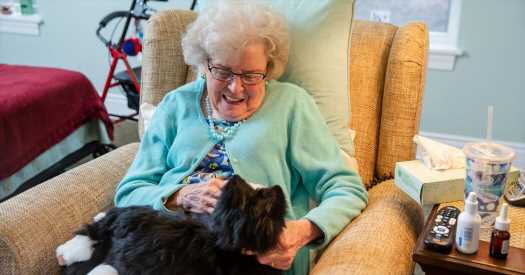In Isolating Times, Can Robo-Pets Provide Comfort?

As seniors find themselves cut off from loved ones during the pandemic, some are turning to automated animals for company.
By Paula Span
When Linda Spangler asked her mother, in a video chat, what she would like as gift for her 92nd birthday, the response came promptly.
“I’d like a dog,” Charlene Spangler said. “Is Wolfgang dead?” Wolfgang, a family dachshund, had indeed died long ago; so had all his successors. Ms. Spangler, who lives in a dementia care facility in Oakland, Calif., has trouble recalling such history.
Her daughter, a doctor, considered the request. Before visitors were barred from the residence because of the Covid-19 pandemic, Dr. Spangler had seen her mother every other day, often taking her to Lake Merritt in her wheelchair to see the ducks and to pat passing dogs.
In her facility, Charlene Spangler had eaten meals with several other residents, joined art classes and listened to visiting musicians.
Now activities and communal meals have vanished. Aside from one quick visit in the lobby, she has not seen her daughter in person in six months; they communicate through 15-minute video calls when staff members can arrange them.
“She’s more isolated in her room now,” Dr. Spangler said. “And she misses having a dog.”
Knowing that her mother couldn’t manage pet care, even if the residence had permitted animals, Dr. Spangler looked online for the robotic pets she had heard about.
She found a fluffy puppy with sensors that allow it to pant, woof, wag its tail, nap and awaken; a user can feel a simulated heartbeat. Unable to deliver the robot personally, she asked a staff member to take it inside. In a subsequent video chat, Dr. Spangler learned that her mother had named the robot dog Dumbo.
Such devices first appeared in American nursing homes and residences for seniors several years ago. A Japanese company began distributing an animatronic baby seal called PARO in 2009, and Hasbro started marketing robotic cats in 2015.
But the isolation caused by the coronavirus, not only in facilities but also among seniors living alone in their homes, has intensified interest in these products and increased sales, company executives said. It has also led to more public money being used to purchase them.
Long before the pandemic, loneliness and social disconnection were acknowledged public health problems for older people, linked to measurably poorer mental and physical health. Now, their risk for serious illness from the coronavirus has denied many seniors the stimulation and comfort of personal visits, cultural events, volunteering, even grocery shopping.
Source: Read Full Article
